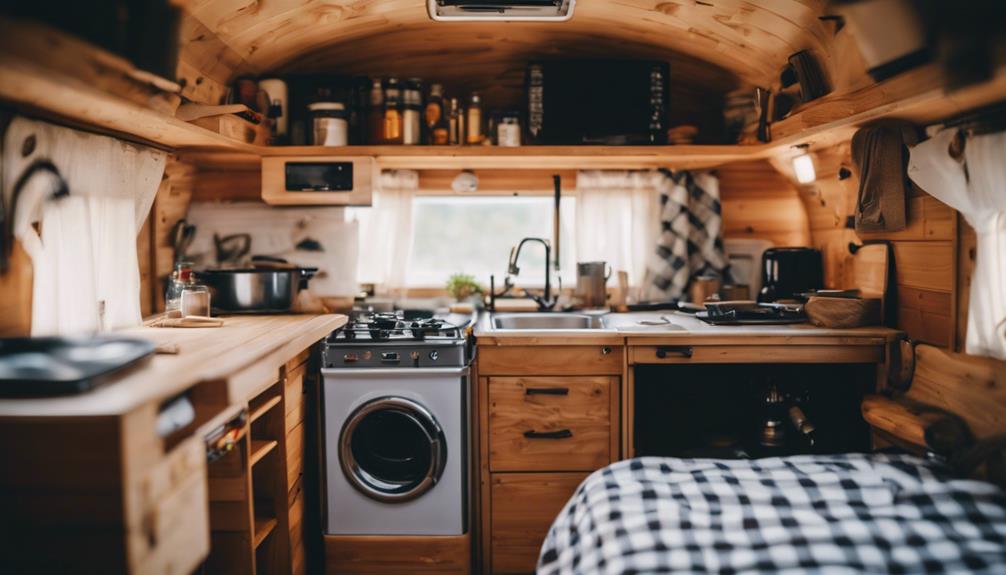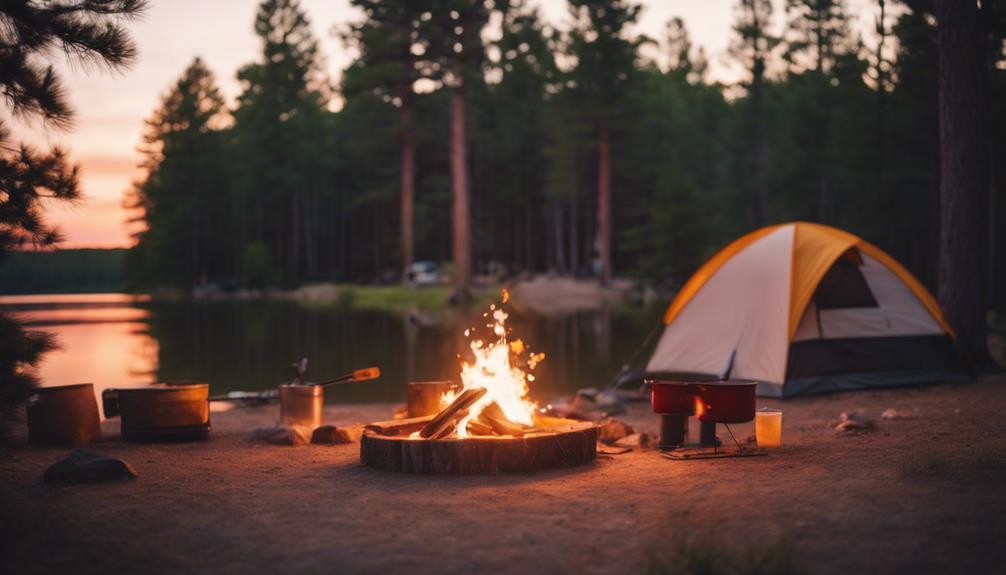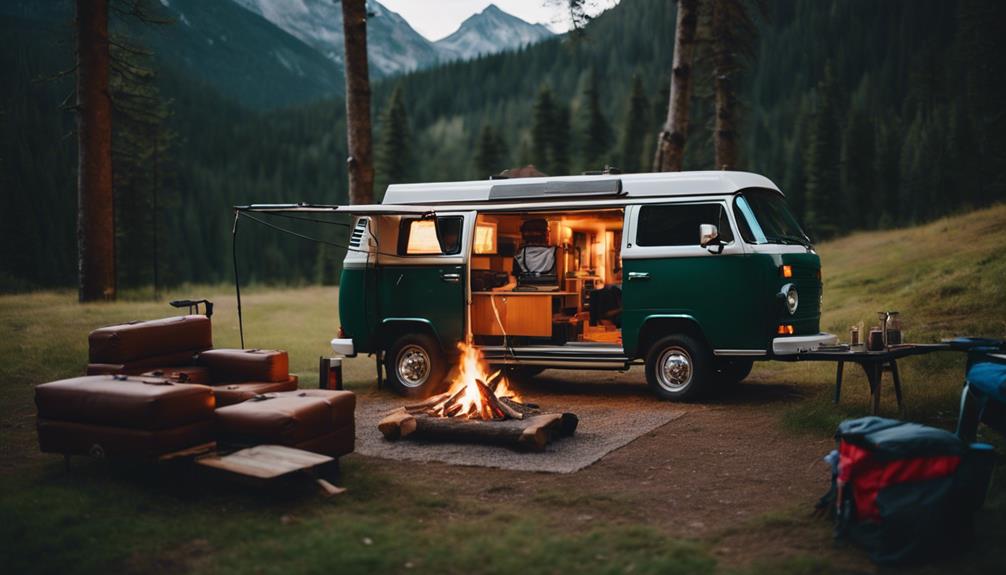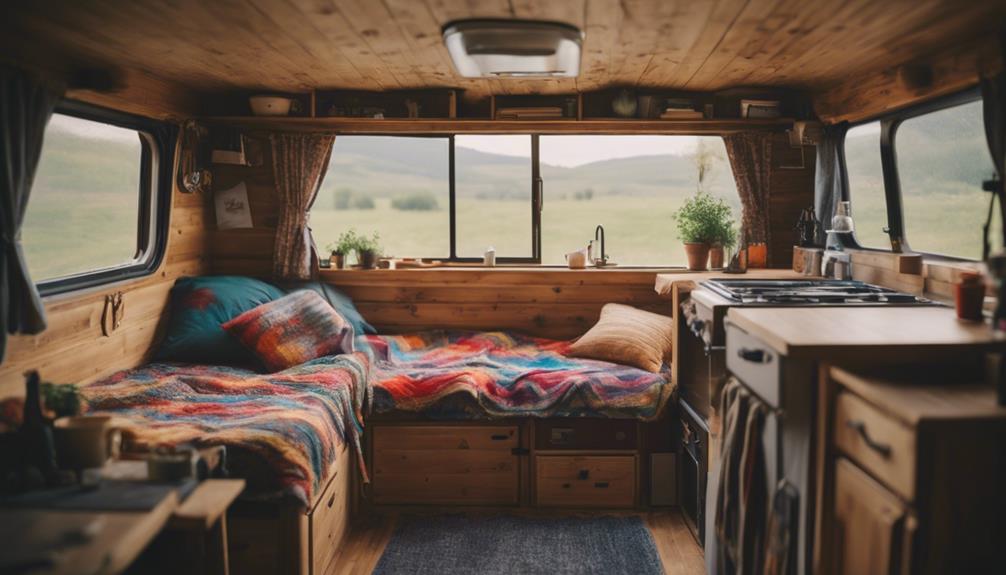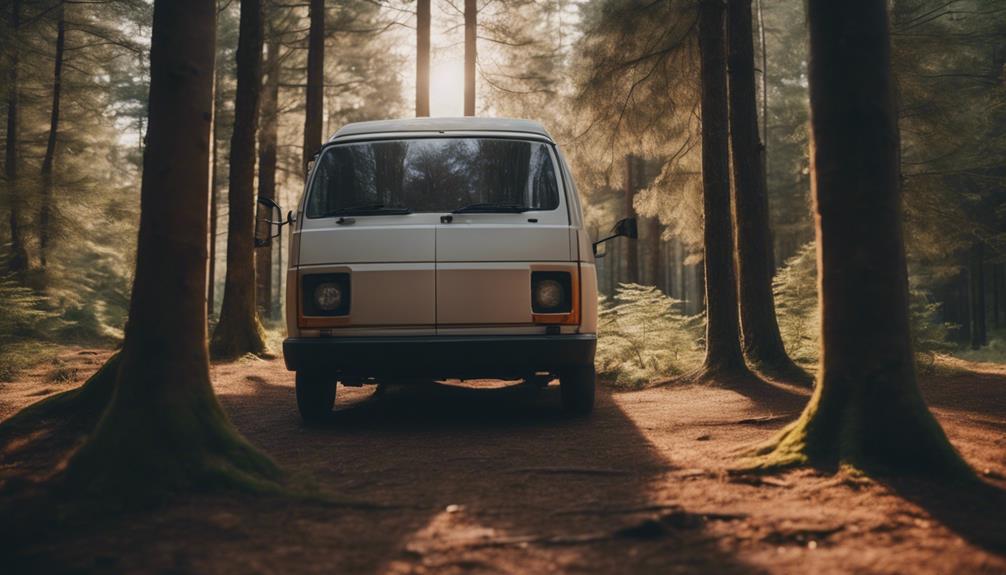You can easily transform a used van into your dream camper with a DIY guide. Start by choosing a suitable vehicle, like a Chevy G20 or Ford Econoline, and plan your layout meticulously for maximum comfort. Insulation is key to keeping your space cozy, so consider Thinsulate for sound and temperature control. Utilize modular conversion kits for quick assembly and community resources for support. Remember to gather essential tools and prioritize safety throughout your build. With some creativity and careful planning, you'll create a personalized traveling space. Keep going to uncover more tips and insights for your camper conversion journey!
Introduction
If you're looking to create a personalized living space on a budget, a DIY camper conversion might just be the perfect project for you. With an estimated total cost of around $2,900 for basic materials and a used van, it's an affordable way to embrace the vanlife experience.
The first step in your DIY campervan conversion is choosing a suitable vehicle, like a Chevy G20 or Ford Econoline.
Once you've got your van, thorough planning is key. You'll need to focus on layout design, which involves measuring your space and determining how to best use it for sleeping, storage, and cooking.
Insulating the van will guarantee comfort during your travels, but don't forget about the electrical system; installing it correctly is crucial for lighting, powering devices, and running appliances.
Don't worry if you're new to this; numerous online guides and community resources are available to help you along the way.
Engaging in this project not only gives you a unique living space but also fosters a sense of accomplishment as you personalize every detail to suit your lifestyle.
Background Information
Campervan culture has evolved considerably over the years, embracing a lifestyle that values freedom and adventure.
With innovative modular conversion kits now available, transforming a van into a cozy living space has never been easier.
Understanding these trends can help you make informed choices for your own DIY camper conversion project.
Campervan Culture Evolution
Since the 1960s, campervan culture has transformed dramatically, attracting a diverse range of enthusiasts seeking adventure, community, and a more sustainable lifestyle.
Today, the concept of van life embodies the freedom of the open road, blending travel with home-like comfort. DIY camper van conversions have surged in popularity, allowing you to customize your space to fit your unique needs and preferences.
The rise of social media has played a significant role in this evolution, creating a vibrant online community where you can share tips, travel experiences, and design inspiration. During the global pandemic, interest in campervans skyrocketed as people sought safe travel options while maintaining social distancing. This shift showed just how much people value the versatility of camper vans as both leisure vehicles and mobile workspaces.
Sustainable living has also become central to the campervan community, with many focusing on eco-friendly materials and off-grid power solutions. As the campervan rental market continues to grow, it's clear that the demand for compact and adaptable living spaces is here to stay.
Embracing this culture opens up a world of exploration and connection with nature.
Innovative Modular Conversion Kits
Innovative modular conversion kits simplify the camper van conversion process, making it easier than ever for you to create a personalized and functional living space. These kits come with pre-fabricated components that require minimal carpentry skills, allowing you to focus on your design rather than complex construction.
You'll find essential elements like beds, kitchen modules, and storage solutions included, which means you can quickly assemble and customize your van according to your needs.
Many modular kits use lightweight materials, improving your vehicle's fuel efficiency while ensuring durability and structural integrity. This is particularly beneficial for your DIY van build, as it keeps the weight down without sacrificing quality.
Additionally, some companies design modular kits compatible with various van models, giving you the versatility to convert different vehicles.
With thorough installation guides typically included, even first-time builders can achieve a professional-looking finish. So, if you're ready to engage in the camper van conversion process, consider these innovative modular conversion kits.
They'll not only save you time but also help you craft the ideal living space for your adventures.
Recent Design Innovations
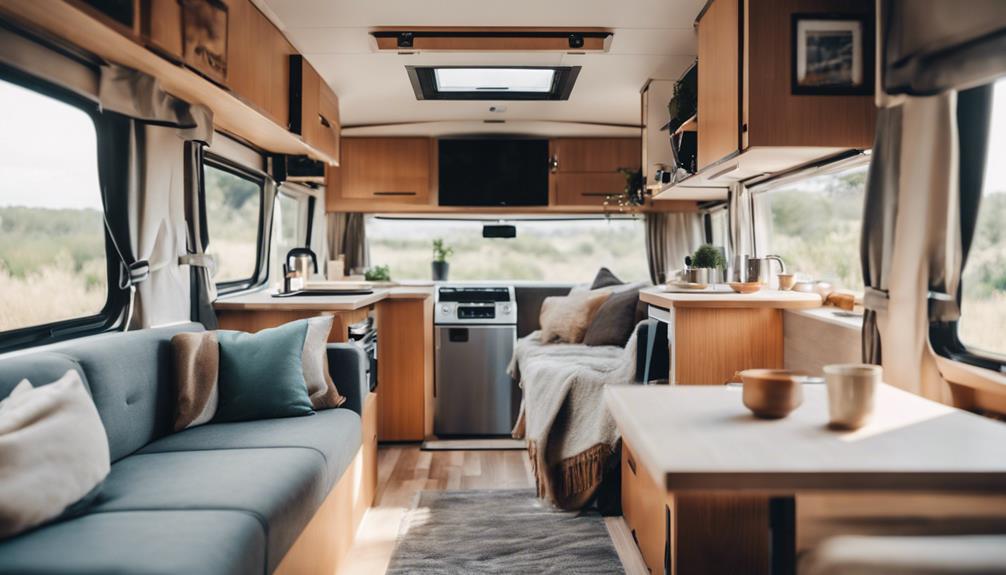
Recent design innovations in camper conversions are revolutionizing the way you experience life on the road.
You'll find smart home integration features that let you control your camper's systems right from your phone, alongside modular furniture options that adapt to your changing needs.
These advancements not only enhance comfort but also make your space more functional and efficient.
Smart Home Integration Features
Smart home integration features in camper conversions enhance your traveling experience by offering convenient control over energy consumption and comfort settings. With devices like smart thermostats and app-controlled lighting systems, you can manage your camper's environment remotely, ensuring it's always just right when you arrive.
Energy management systems play an essential role here, allowing you to track solar panel output, battery status, and overall energy usage all through a centralized app interface.
For added peace of mind, you can install advanced security systems that utilize smart locks and cameras. These systems connect to your mobile device, enabling real-time monitoring and control of your vehicle, so you can feel secure wherever you park.
Moreover, voice-activated assistants like Amazon Alexa or Google Assistant can seamlessly integrate into your setup, giving you hands-free control to adjust the temperature, check battery levels, or even turn on lights.
Smart sensors can also enhance your experience by monitoring water levels in tanks and detecting potential leaks, sending alerts directly to your smartphone.
With these innovations, your camper conversion can truly feel like a smart home on wheels.
Modular Furniture Options
Modular furniture options in camper conversions are revolutionizing how you utilize space, offering multifunctional designs that adapt to your changing needs.
These innovative pieces serve as seating, storage, and sleeping areas, maximizing every inch of limited space. With customizable modular furniture kits, you can easily assemble and disassemble components, making them flexible enough to fit various layouts and purposes.
Modern designs often incorporate lightweight materials like plywood and aluminum, ensuring durability while keeping your vehicle's weight manageable. Integrated features, such as hidden compartments and foldable elements, enhance functionality. For instance, a table might convert into a bed, allowing you to shift seamlessly from lounging to sleeping.
Recent trends also focus on aesthetic appeal, providing a range of finishes and colors. This means you can personalize your living space while maintaining a cohesive look.
With these modular furniture options, you can create a camper that not only meets your practical needs but also reflects your style. Embrace the possibilities and transform your camper into a versatile living environment that moves with you.
User Experience Feedback
When it comes to your DIY camper conversion, user experiences and insights can be invaluable.
You'll find testimonials and reviews that highlight common challenges and successful strategies, helping you make informed decisions.
Plus, comparing features of different kits based on real user feedback can save you time and money.
User Experiences and Insights
Many DIY camper converters find that careful planning and design lead to a more functional and comfortable living space. A well-thought-out van layout is essential, as it affects everything from storage to daily activities.
Many users emphasize the importance of selecting the right insulation material, with options like Thinsulate becoming popular for their efficiency and ease of installation. Proper insulation not only helps maintain temperature but also improves overall comfort during trips.
Incorporating dual-purpose furniture is another key insight from converters. For instance, a bed that doubles as a couch can save space and enhance livability in a compact van. This approach allows you to maximize every inch, making your camper more versatile.
Many DIY enthusiasts also recommend documenting the build process. Not only does this create a personal record, but it also provides insights for future projects and can help others in the community.
Engaging with online vanlife communities can further enrich your experience, offering tips and fostering a sense of camaraderie. By sharing challenges and solutions, you'll find that the DIY journey becomes even more rewarding.
User Testimonials and Reviews
Users often rave about the satisfaction that comes from customizing their DIY camper conversions to perfectly match their travel needs. Many share user testimonials highlighting how personalizing their layout greatly enhances their travel experience.
With a well-thought-out plan and budget, countless converters have completed their projects for under $3,000, showcasing the cost-effectiveness of DIY versus professional conversions.
Feedback frequently emphasizes the importance of engaging with online communities and forums during the process. These platforms offer valuable advice and support, making the conversion journey smoother and more enjoyable.
You'll find that many users take great pride in learning new skills while building their campers, allowing them to create a functional and personalized living space.
Flexibility is another advantage highlighted in testimonials. Many converters appreciate that they can make ongoing adjustments based on their experiences.
Whether you're working on camper van electrical systems or enhancing comfort features, the DIY approach empowers you to adapt your space as your needs evolve.
Feature Comparison of Kits
DIY camper conversion kits stand out for their thorough instructions and pre-cut materials, drastically cutting down installation time compared to starting from scratch.
Many users appreciate the modular design of these DIY kits, as it allows for easy customization and scalability based on your unique needs and the available space in your van. This flexibility is a significant advantage, especially if you're looking to make adjustments down the line.
Kits that include insulation materials, like Thinsulate, receive high praise for their effectiveness in maintaining temperature control and minimizing noise. As a result, you'll enjoy a more comfortable travel experience.
When considering cost comparisons, you'll find that opting for DIY kits can save you up to 30% compared to professional conversions. This makes them an appealing choice for budget-conscious builders.
Additionally, community support and online resources often accompany these kits, providing valuable insights and troubleshooting tips throughout your conversion journey. This accessibility helps you feel more confident as you tackle your project, ensuring that you're not alone in the process.
Essential Tools for Conversion
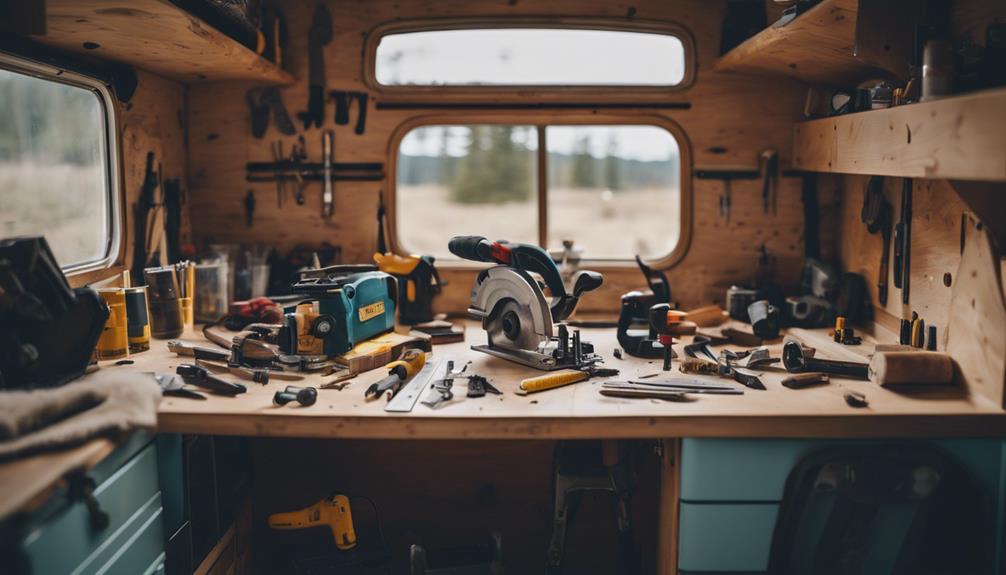
When you're gearing up for a camper conversion, having the right tools makes all the difference in the process.
You'll want to focus on both the detailed conversion steps and the necessary safety precautions to keep yourself protected.
Let's explore the essential tools that'll help you tackle your project effectively.
Detailed Conversion Process
A well-equipped workspace is essential for a successful camper conversion, ensuring you have all the important tools at hand for an efficient and organized build process. You'll need a power drill, circular or jigsaw saws, and a measuring tape to accurately cut and fit your materials. A level and a variety of screwdrivers will help you install components securely.
Don't forget to include a staple gun for securing insulation and paneling, and a heat gun for bending plastics or sealing edges. Having a sturdy workbench will also save you time and enhance your efficiency while cutting and assembling materials.
To elevate the quality of your conversion, consider adding tools such as a router for smooth edges, a multimeter for electrical diagnostics, and a wrench set for plumbing connections. These tools not only improve functionality but also make your camper feel more like home.
Safety Precautions for Conversions
Prioritizing safety precautions is essential during your camper conversion to prevent accidents and guarantee a smooth building process. Start by wearing safety glasses and gloves whenever you're cutting or drilling. These protect you from metal shavings and sharp edges, which can lead to injuries without proper gear.
Ascertain your workspace is well-ventilated, especially when working with insulation, adhesives, or paints that emit harmful fumes. Additionally, keep a fire extinguisher rated for Class B fires nearby, particularly when handling propane systems, as propane is highly flammable.
When using power tools, always follow the manufacturer's instructions and maintain your tools properly. This not only keeps you safe but also improves the efficiency of your work.
Lastly, have a first aid kit on hand for minor injuries, and consider taking a basic first aid and CPR course. Being prepared for emergencies can make all the difference during your conversion process.
What Are the Steps for Doing Your Own Camper Conversion Using the Essential Supplies Provided?
Are you ready to tackle your own camper conversion project? With the right essential camper conversion supplies, you can transform your vehicle into a cozy home on wheels. Start by planning the layout, gathering basic tools, and getting the necessary materials. With the right supplies and a bit of creativity, you can create your dream camper.
Conclusion
Completing a DIY camper conversion can transform your travel experience, offering a unique blend of comfort and adventure tailored to your lifestyle. By initiating this conversion journey, you're not just creating a mobile living space; you're crafting a home that reflects your personal style and needs.
Remember to prioritize planning and budgeting throughout the process. The estimated conversion cost can range from $2,900 to $10,000, so it's important to manage your expenses wisely. Take the time to purchase a suitable van, gut the interior, and design a layout that maximizes functionality. Installing necessary systems like electrical and plumbing is vital for a comfortable living experience.
Using second-hand materials and DIY solutions can help you save considerably, making your vanlife dream more attainable. Engage with the vibrant vanlife community through online forums and social media for inspiration, support, and tips from fellow enthusiasts.
In the end, your DIY camper conversion is a reflection of your creativity and resourcefulness. Embrace the journey, and you'll find that the process is just as rewarding as the adventures that await you on the open road.
Frequently Asked Questions
How Much Does a DIY Campervan Conversion Cost?
A DIY campervan conversion typically costs between $2,900 and $10,000, depending on your van and materials. If you use second-hand items or DIY solutions, you can save greatly on your overall budget.
What Is the Best Campervan Conversion Guide?
The best campervan conversion guide breaks down the entire process, offering clear steps, cost estimates, and essential features. Look for guides that include videos and community support to enhance your DIY experience and guarantee success.
What Order to Do Camper Conversion?
When starting your camper conversion, plan the layout, tackle structural modifications first, install electrical and plumbing systems, add essential appliances, then focus on cabinetry, and finish with interior touches, ensuring everything functions properly throughout.
Is It Cheaper to Build Your Own Camper?
Yes, it's cheaper to build your own camper. By using second-hand materials and doing the work yourself, you can greatly cut costs, making it an affordable option compared to professional conversions that can be quite expensive.
Conclusion
In summary, converting your camper is an exciting and rewarding project that lets you express your creativity and tailor your space to your needs.
With the right tools and knowledge from this guide, you can transform a simple vehicle into your dream getaway.
Remember to gather feedback from fellow DIYers and stay updated on the latest design trends.
So grab your tools, release your imagination, and hit the road in your personalized camper!

